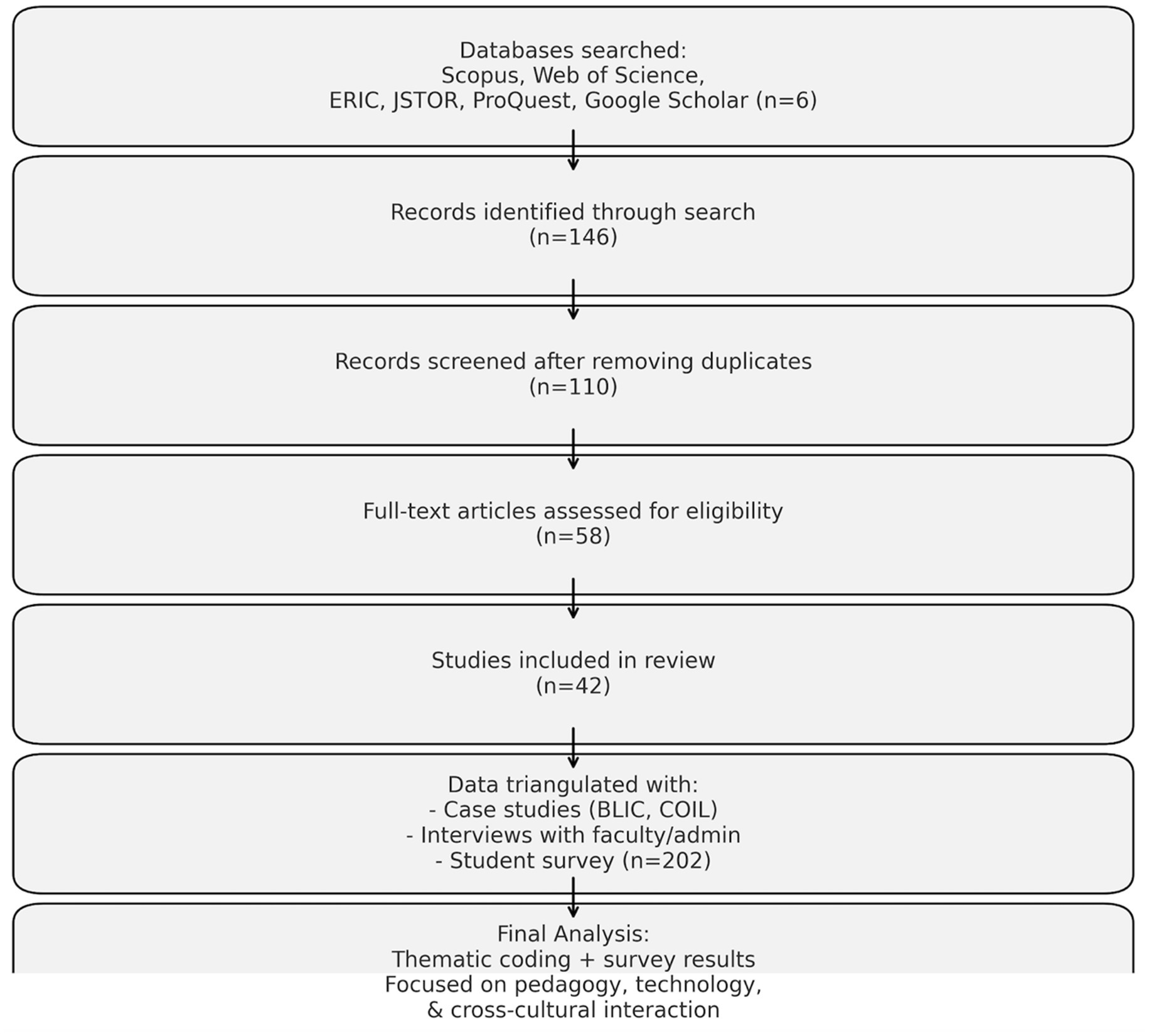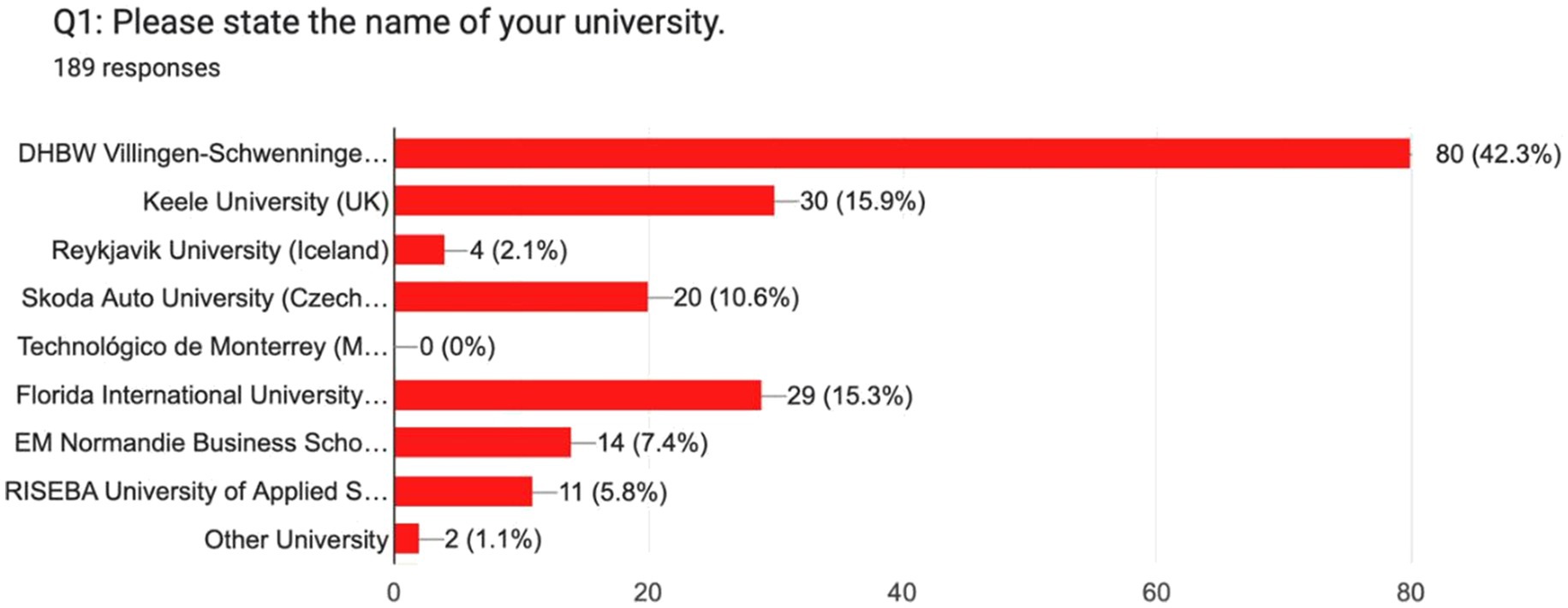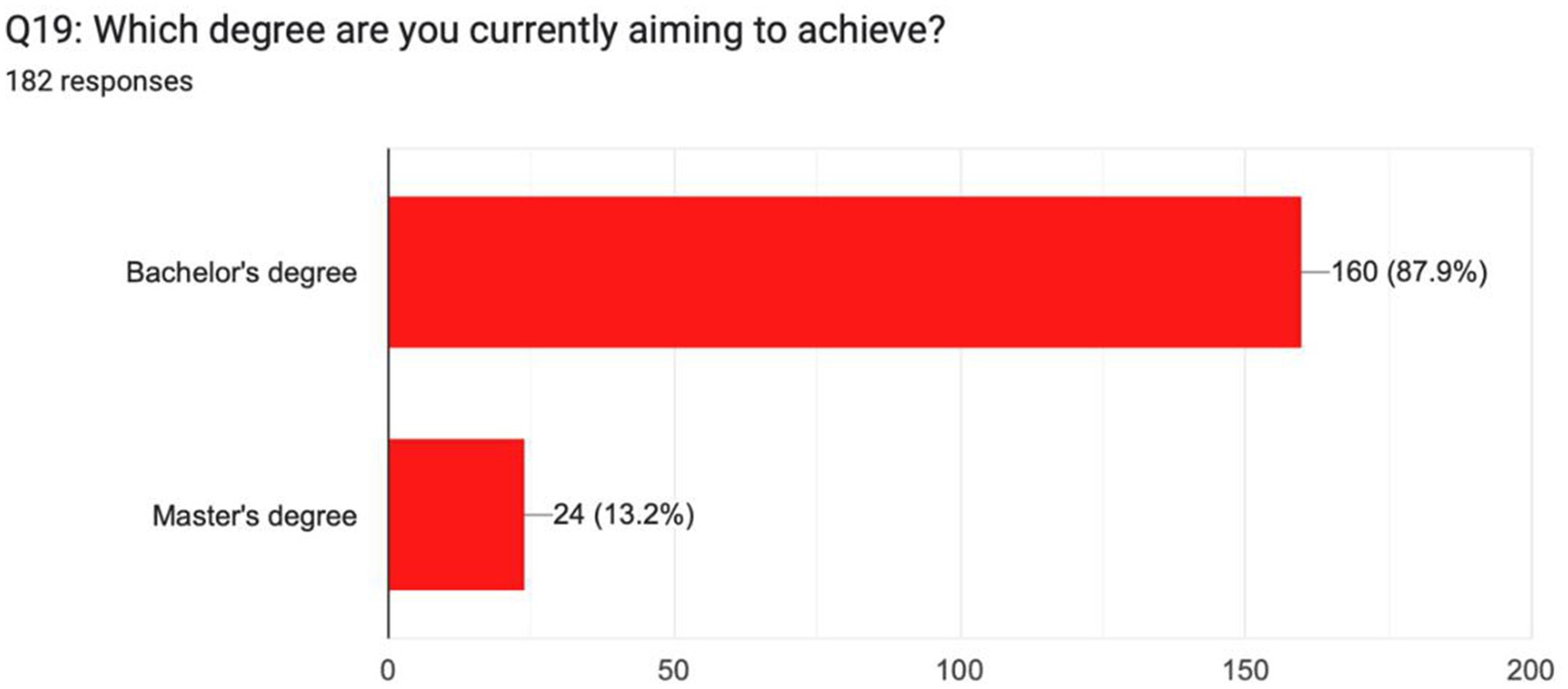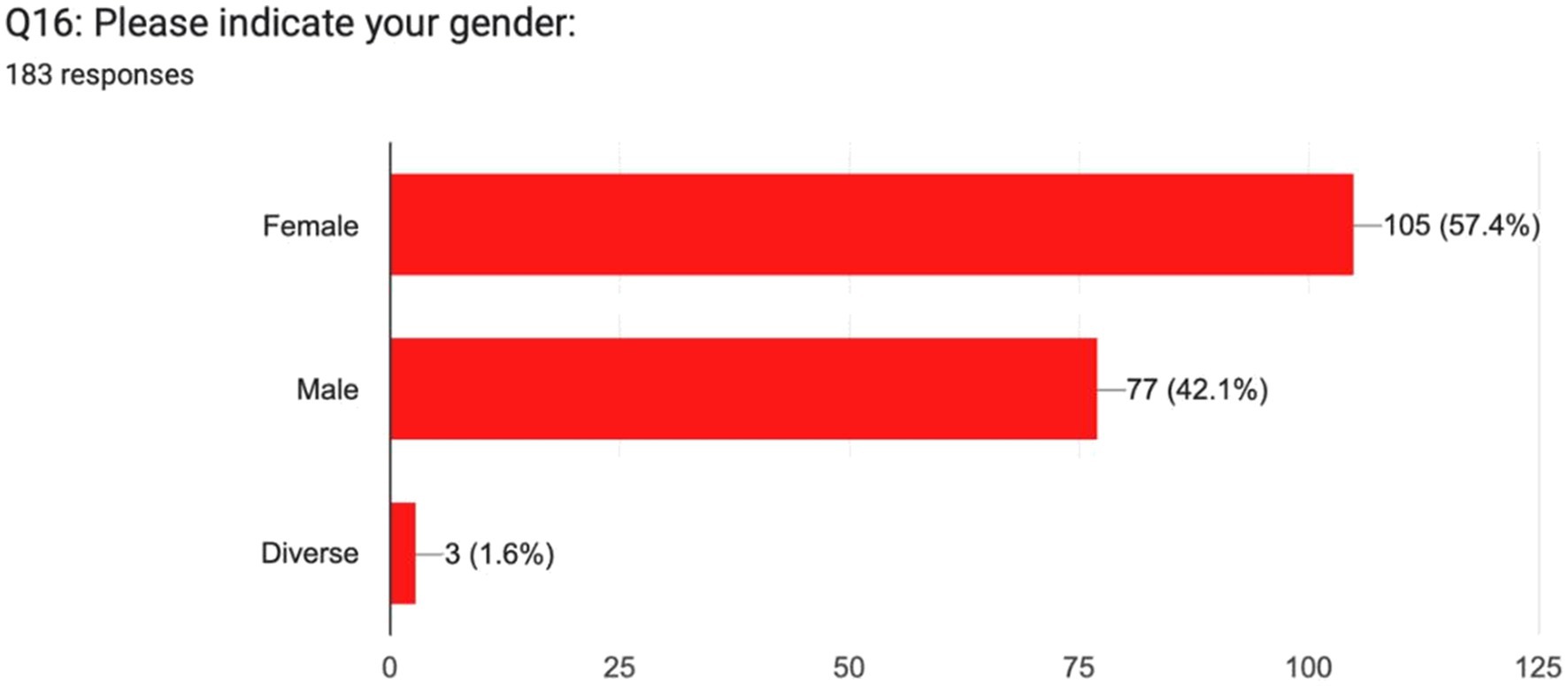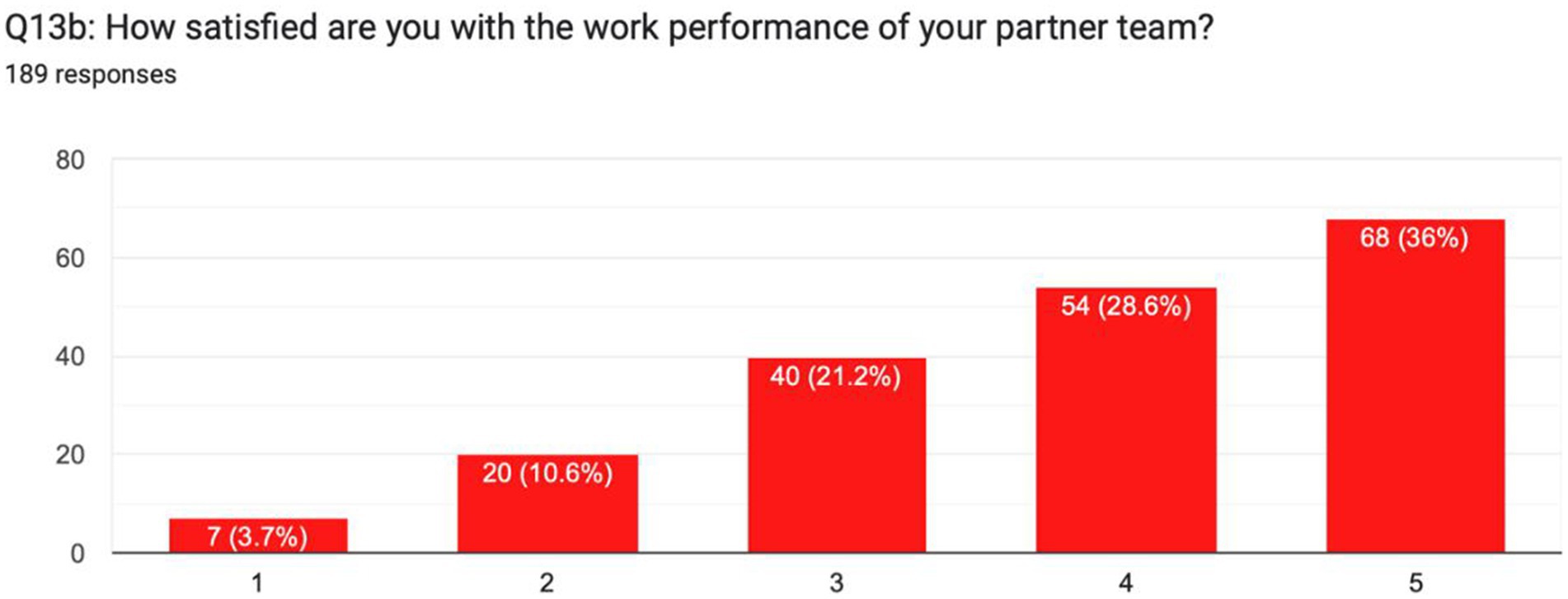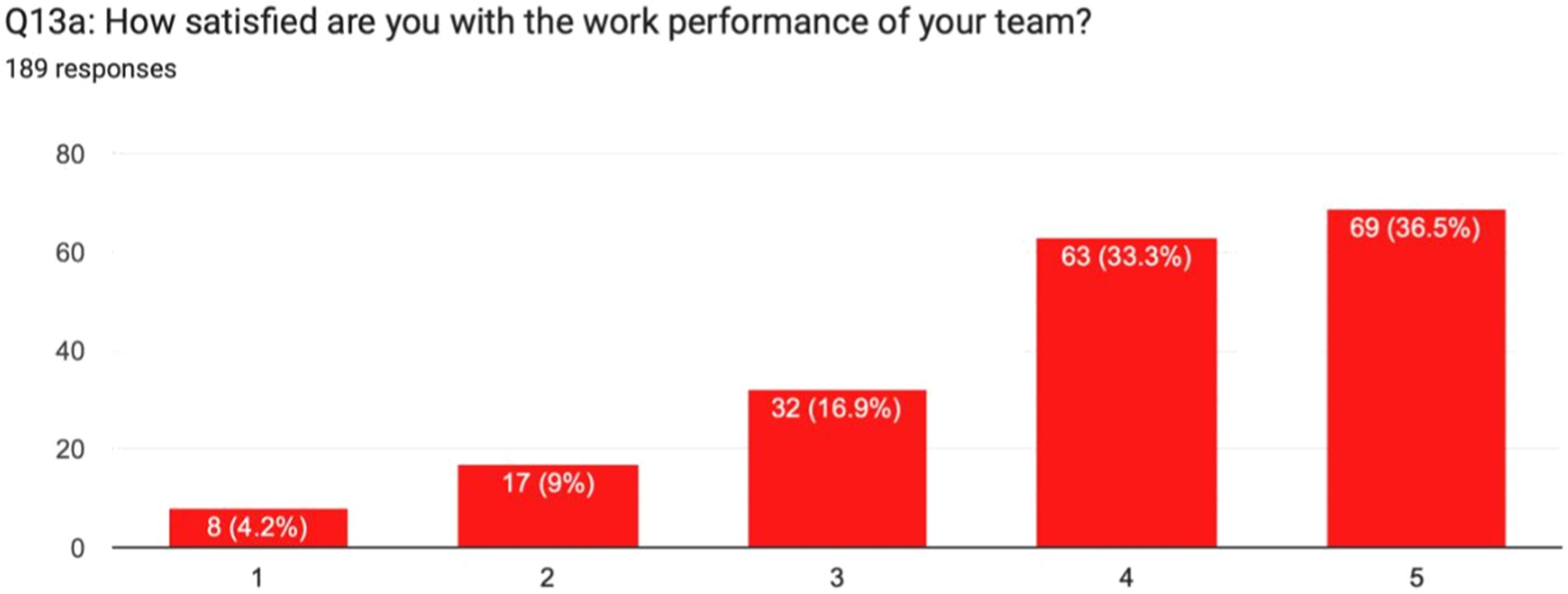- 1Baden-Wuerttemberg Cooperative State University (DHBW), Villingen-Schwenningen, Germany
- 2School of Business, University of Chemistry and Technology, Prague, Czechia
- 3Faculty of Business and Economics, RISEBA University of Applied Sciences, Riga, Latvia
- 4Keele Business School, Keele University, Keele, United Kingdom
Introduction: Blended learning has emerged as a key strategy in management education, combining face-to-face teaching with digital tools to enhance flexibility, engagement, and skill development. When integrated with international cooperation projects, it enables pedagogical innovation and better prepares students for the complexities of global business environments.
Methods: This study employs quantitative analysis of course performance and engagement data to assess the impacts of blended learning combined with international collaboration. It draws on contemporary practices such as Collaborative Online International Learning (COIL), virtual exchange, and interdisciplinary teamwork to evaluate curriculum design, student outcomes, and institutional strategies.
Results: Findings demonstrate that blended learning facilitates the development of cross-cultural communication, ethical reasoning, and adaptive problem-solving skills. Technology-based experiential learning components like virtual internships, case simulations, and immersive platforms significantly enhance student engagement. However, challenges including digital inequities, resistance to pedagogical change, and the design complexity of effective blended environments persist.
Discussion: Addressing these challenges requires targeted faculty training, robust infrastructure, and supportive policies. Future opportunities include leveraging artificial intelligence for personalized learning, gamification for increased engagement, and data analytics for real-time feedback. The study also highlights the critical role of academia–industry partnerships in creating impactful learning experiences. Ultimately, integrating blended learning with international collaboration advances management education toward more sustainable, inclusive, and practice-oriented models suited for a globally interconnected economy.
Introduction
The rapid globalization of business has necessitated a paradigm shift in management education to prepare students for complex, interconnected, and culturally diverse work environments. Traditional teaching methods, which focus predominantly on theoretical instruction, are increasingly inadequate in addressing the multifaceted challenges of modern international business (IB). As a result, institutions worldwide are embracing innovative pedagogical frameworks that prioritize experiential learning, cross-cultural competency, and technological integration (Bizami et al., 2023). These approaches aim to bridge the gap between theory and practice while fostering skills essential for navigating the dynamic global business landscape. Blended learning, which combines traditional face-to-face teaching with online education, has emerged as a particularly effective strategy for fostering interactive, flexible, and personalized learning experiences (Martín-García, 2020). Through international cooperation projects, such as virtual exchanges and Collaborative Online International Learning (COIL), students gain access to diverse perspectives, collaborative opportunities, and real-world challenges without the logistical and financial barriers associated with study abroad programs. These frameworks not only enhance accessibility but also ensure inclusivity, enabling a broader range of students to engage in global learning experiences.
Despite the growing adoption of blended learning and international collaboration tools, there remains a significant gap in the empirical research that systematically evaluates their combined impact within fully accredited, multi-institutional management programs. Existing studies often focus either on technology integration or on isolated experiential activities, without assessing how structured international collaborations influence key student competencies such as cognitive flexibility, cross-cultural awareness, and real-world problem-solving. Despite its advantages, experiential learning faces challenges, including high development costs, the need for realistic simulations, and the necessity of continuous assessment to ensure meaningful learning outcomes (De Melo et al., 2021).
This study addresses this critical void by examining a comprehensive and longitudinal implementation of the Blended Learning International Cooperation (BLIC) initiative across multiple universities. By analyzing student experiences and pedagogical outcomes within this integrative framework, this research offers a novel contribution: it is one of the first to provide robust, practice-oriented insights into how blended learning, when deliberately embedded in cross-border cooperation and experiential curriculum design, transforms management education. The novelty lies in the study’s focus on accredited, curriculum-embedded international initiatives, rather than pilot programs or extracurricular modules, thereby enhancing its relevance to institutional strategy, policy formulation, and scalable innovation.
The increasing adoption of virtual and hybrid platforms has also sparked interest in integrating innovative pedagogies into IB education (Hamzah et al., 2024). Tools such as simulations, role-plays, and design thinking workshops are being utilized to replicate complex business scenarios and cultivate critical thinking, adaptability, and problem-solving skills (Mushtaq and Iqbal, 2024). Furthermore, these approaches foster cognitive flexibility and openness, which are vital traits for building resilience and thriving in uncertain environments. However, the effectiveness of such pedagogies depends on institutional support, resource allocation, and faculty engagement (Panakaje et al., 2024).
Building on these insights, this paper explores the intersection of blended learning, international cooperation, and innovative pedagogy in management education. Specifically, it addresses three research questions: (1) How does the integration of blended learning and international cooperation initiatives influence the development of student competencies such as cognitive flexibility, cross-cultural awareness, and applied problem-solving in management education? (2) To what extent do blended learning and international cooperation projects reduce or exacerbate digital inequities and inclusivity gaps in access to international business education? (3) What institutional, technological, and pedagogical factors enable or constrain the successful scaling of blended and experiential learning initiatives across multiple universities in international business education?
Literature review
Blended Learning International Collaboration
The Blended Learning International Cooperation (BLIC) project represents a collaborative educational initiative among six business schools spanning Europe (United Kingdom, Germany, Czechia, Iceland, Ireland, and Latvia) and North America (Florida, USA). All participating students were undergraduates enrolled in Business and Management programs. The BLIC courses—including Strategic Management, Doing Business in Emerging Markets, International Marketing, International Business, and Cross-Cultural Management—were conducted throughout the Fall 2024 semester, with teaching formats combining face-to-face instruction, digital resources, and structured international collaboration.
Critically, these BLIC courses are fully integrated into the official syllabuses of each institution’s bachelor program, ensuring they meet national and international accreditation standards. This not only guarantees formal recognition of learning achievements but also affirms the academic credibility and transferability of student qualifications within and across educational systems. Students completing these modules gain academic and professional credentials that are widely respected by employers and academic institutions globally.
To robustly assess student engagement, learning outcomes, and the effectiveness of the Blended Learning International Cooperation model, an online survey was administered anonymously from October 30th to November 30th, 2024. All undergraduate participants were invited to respond, providing candid feedback about their experiences regarding pedagogical practices, course design, and perceived value.
The BLIC project addresses several important research gaps in the literature. Despite the widespread adoption of blended learning, there is a lack of empirical evidence examining its impact within cross-border, accredited management programs and on student learning outcomes in multinational environments (Kanwal et al., 2023). Most research to date focuses primarily on technological or design aspects, with limited attention paid to how such programs facilitate intercultural exchange, collaboration, and comprehensive skill development (Garrison and Kanuka, 2004; Graham, 2013; Means et al., 2013). Furthermore, few studies have explored student outcomes and experiences in officially recognized, accredited international cooperation settings (O’Dowd and Lewis, 2016; Muldoon et al., 2020; Picciano, 2019). By executing a multi-institutional, systematically assessed initiative, BLIC generates practice-oriented empirical data to inform educators, policymakers, and institutions aiming to design, evaluate, or scale blended learning and international collaboration strategies in business education.
This structured approach provided a robust framework to assess student engagement, learning outcomes, and the overall impact of integrating blended learning with international collaboration in management education. The detailed information about participant demographics, course content, and survey methodology offers essential guidance for institutions intending to replicate or adapt similar blended learning strategies within global academic partnerships.
The shift toward experiential learning in management education
Experiential learning has gained prominence as a transformative approach to management education, addressing the limitations of traditional teaching methods. By connecting theoretical concepts with real-world applications, experiential learning fosters deeper engagement, critical thinking, and adaptability (Adera, 2025). Okoli et al. (2019) emphasize that tools such as simulations, role-plays, and collaborative projects create dynamic learning environments where students develop practical skills alongside academic knowledge.
Aggarwal and Wu (2019a) highlight that experiential learning cultivates a global mindset, enabling students to synthesize information across disciplines while accounting for cultural and national differences. This is particularly significant in international business education, where cross-cultural competence is essential for navigating diverse and unpredictable markets. Yeh and Zoeckler (2022) reinforce this perspective, noting that experiential learning equips students with the tools to handle ambiguity and complexity in global contexts.
The role of technology and virtual exchanges
The integration of technology into education has opened new avenues for experiential learning, particularly through virtual exchanges. Programs such as BLIC, COIL, X-Culture, and Telecollaboration facilitate collaboration between geographically separated students and faculty, fostering global awareness and cross-cultural skills (Zak, 2021). These virtual platforms provide an inclusive and cost-effective alternative to traditional study abroad programs, addressing the accessibility challenges faced by many students (Suarez and Haduch, 2020). Viswanathan et al. (2022) argue that incorporating technology, gaming, and virtual reality enhances student engagement and replicates real-world business scenarios. However, the success of such initiatives depends on institutional commitment, robust technological infrastructure, and the active participation of educators.
Cognitive flexibility and openness as key traits
Cognitive flexibility and openness are critical competencies for students navigating the global business environment. Cognitive flexibility, defined as the ability to adapt to changing situations and reevaluate perspectives, fosters resilience and creativity (Herman 2012). Openness, which encompasses curiosity and a willingness to embrace diverse viewpoints, further enhances cross-cultural adaptability (Ross et al., 2009).
Research indicates that experiential learning and virtual exchanges significantly contribute to developing these traits. For instance, students engaged in global virtual teams demonstrate increased empathy, adaptability, and critical thinking (Aggarwal and Wu, 2019b). This suggests that fostering cognitive flexibility and openness should be a core objective in the design of management education programs.
While the existing literature provides a solid foundation for understanding the benefits of blended learning and international collaboration, it also reveals notable limitations and internal contradictions. One key issue is the overemphasis on technological infrastructure at the expense of pedagogical coherence. Many studies celebrate the deployment of virtual tools without sufficiently examining how these technologies align with learning objectives or promote deep cognitive engagement. Additionally, there is a recurring assumption that blended and virtual international experiences inherently foster intercultural competence, yet little empirical evidence interrogates the quality or depth of these cross-cultural interactions.
Furthermore, much of the research remains context-specific, lacking cross-institutional or comparative perspectives that can inform broader implementation. There is a scarcity of longitudinal data exploring the sustained impact of blended international initiatives on student outcomes, especially regarding critical thinking, ethical reasoning, and adaptability. Contradictions also arise around equity: while virtual exchanges are often lauded as inclusive alternatives to study abroad, digital divides and uneven faculty training can exacerbate inequities, particularly in under-resourced institutions.
These gaps highlight a need for more integrative, critically engaged studies that evaluate both pedagogical efficacy and institutional feasibility. This study responds to that call by offering a multi-institutional, practice-oriented investigation of blended learning within accredited international business programs.
Methodology
This study employs a mixed-methods approach to explore the integration of blended learning, international cooperation, and innovative pedagogy in management education. It builds upon the Community of Inquiry (CoI) framework developed by Garrison and Akyol (2013), which highlights the interaction of three core elements: social presence, or the ability of participants to identify with the community, communicate purposefully, and develop interpersonal relationships; cognitive presence, or the extent to which learners can construct and confirm meaning through sustained reflection and discourse; and teaching presence, which refers to the design, facilitation, and direction of cognitive and social processes to achieve meaningful learning outcomes (Valverde-Berrocoso and Fernández-Sánchez, 2020). In the context of international blended learning collaborations, the CoI framework supports the development of intercultural communicative competence by fostering environments where students from diverse backgrounds engage in meaningful dialogue and collaborative activities (Valverde-Berrocoso and Fernández-Sánchez, 2020). The literature review was conducted across six academic databases (Scopus, Web of Science, ERIC, JSTOR, ProQuest, and Google Scholar). After applying inclusion and exclusion criteria, 42 peer-reviewed articles and book chapters were selected for detailed analysis (see Figure 1).
Key search terms included “blended learning,” “experiential learning,” “international cooperation in education,” “virtual exchange,” and “cognitive flexibility.” This ensured a comprehensive overview of both the pedagogical and technological dimensions of blended international education.
To complement the literature review, case studies of successful blended learning initiatives (BLIC) and virtual exchange programs such as COIL were analyzed to identify best practices and recurring implementation challenges. These case studies were triangulated with insights from semi-structured interviews conducted with educators and administrators directly engaged in international cooperation projects.
To gather student perspectives, an online survey was administered to participants across European and American business schools involved in the BLIC initiative. The survey remained open from October 30 to November 30, 2024, providing sufficient time for responses. It was conducted anonymously to ensure candid feedback and protect respondent privacy. The survey data were analyzed alongside qualitative insights, with a focus on three key areas: the effectiveness of experiential learning tools, the role of technology in fostering global competencies, and the relationship between cognitive traits and student resilience and adaptability.
Case study selection was based on participants’ direct involvement in the BLIC project across partner institutions. Interviewees were purposively sampled to ensure diverse representation, including faculty coordinators, course designers, and program administrators. Selection criteria included active engagement in curriculum delivery and oversight of virtual collaboration. Qualitative data from interviews were analyzed through thematic analysis, following Braun and Clarke’s (2006) framework. Transcripts were coded inductively to identify recurring patterns relating to pedagogy, technology, and cross-cultural interaction. This methodological approach ensured a rigorous, context-sensitive understanding of the key factors shaping blended international education practices.
Results and discussion
Descriptive statistics
We have conducted through Google forms anonymous survey among the Blended Learning International Cooperation network on Pedagogy innovation, usage of digital platforms by the students and students performance. The survey was conducted in the period November–December 2024 among the BLIC partners (Figure 2).
Within the BLIC project the students were representing mainly bachelor programs and only 13.2% of the students were studying in master program (Figure 3).
The distribution of the students population was balanced as the female students were representing around 57% and the male 42% (Figure 4).
The findings from this study reinforce and extend the growing body of literature supporting the integration of blended learning and international collaboration in management education. In alignment with Garrison and Kanuka (2004) and Yeh and Zoeckler (2022), our results confirm that when designed thoughtfully, blended learning not only enhances academic performance but also fosters essential soft skills such as cognitive flexibility, intercultural competence, and adaptability (Figure 5).
Students in the BLIC program reported significant gains in their ability to navigate complex team dynamics, engage with cross-cultural content, and develop real-world problem-solving skills—outcomes that are echoed in studies by Aggarwal and Wu (2019a) and Velinov and Bleicher (2023).
However, this study adds a unique dimension by embedding these pedagogical practices within fully accredited, cross-border university programs. This contrasts with much of the existing literature, which often focuses on pilot projects or informal virtual exchanges.
As such, the BLIC initiative provides new empirical evidence on how blended learning can be institutionalized within formal academic structures, offering pathways for scalability and curricular alignment that have been underexplored in prior research (Muldoon et al., 2020; Picciano, 2019).
Nonetheless, our findings also reveal important divergences and challenges that merit further discussion. Although the literature frequently celebrates virtual exchanges as inherently inclusive and accessible (Suarez and Haduch, 2020), our qualitative data suggest a more nuanced reality. Several students and faculty highlighted technological limitations, including inconsistent access to internet, hardware disparities, and difficulties using multiple platforms simultaneously. These practical constraints sometimes hampered student participation and shaped the depth of intercultural interaction. This echoes concerns raised by Viswanathan et al. (2022) and Panakaje et al. (2024), who stress that digital equity is a prerequisite for the success of blended international initiatives.
Another point of divergence lies in assumptions around student engagement. While the literature generally views blended environments as catalysts for active learning, some students in our study reported challenges maintaining motivation, especially in asynchronous settings or when group dynamics were weak. This suggests that technological tools alone do not guarantee engagement—pedagogical structure, instructor presence, and peer interaction remain critical variables, as emphasized in the Community of Inquiry (CoI) framework (Valverde-Berrocoso and Fernández-Sánchez, 2020).
Practical limitations also shaped the findings. First, the reliance on self-reported survey data introduces potential biases, including social desirability and confirmation bias. While anonymity was ensured to enhance honesty, students may have overemphasized positive outcomes, particularly in the context of institutional evaluation. Second, the semi-structured interviews, though rich in insight, were limited to faculty perspectives and did not include administrative staff or non-participating students, which could have broadened understanding of institutional barriers or dropout patterns. Finally, the study was dependent on the functionality of specific platforms (e.g., Moodle, MS Teams), whose limitations—such as interface complexity and compatibility issues—were mentioned by users but not systematically evaluated.
Innovative pedagogy and student outcomes
The findings of this study underscore the effectiveness of innovative pedagogical approaches, such as blended learning, for enhancing management education. Students rated their institutions’ innovativeness at an average of 3.7 out of 5, with the highest ratings linked to universities that employed advanced technological tools and incorporated experiential learning strategies. These findings align with Velinov and Bleicher (2023), who emphasized that experiential learning cultivates critical thinking, global mindset, and problem-solving skills—essential competencies for modern managers.
The integration of Collaborative Online International Learning (COIL) and virtual exchanges was particularly impactful, as these approaches fostered cross-cultural competencies and ethical reasoning. Yeh and Zoeckler (2022) similarly highlighted the importance of cross-cultural skill development, noting that students who engage in global projects demonstrate increased adaptability and resilience. These traits are vital for navigating the complexities of the international business landscape.
Technology as a catalyst for innovation
The role of technology in facilitating innovation pedagogy was a recurring theme in the survey results. Students frequently used online platforms like Moodle and MS Teams, while social media tools played a supplementary role in collaborative assignments. This aligns with Zak (2021), who found that virtual exchanges and technology integration enhance cultural competency and global awareness. However, the study also revealed that institutional databases were underutilized, suggesting an opportunity to better integrate digital research tools into curricula (Srivastava and Srivastava, 2024).
Survey results indicated that students made frequent use of platforms such as Moodle and MS Teams, with social media tools serving a supplementary role in collaborative assignments. This quantitative finding aligns with existing research that positions technology as a catalyst for intercultural competency and global awareness (Zak, 2021). Semi-structured interviews added nuance by revealing that technology’s success depended less on the platforms themselves and more on how courses were redesigned to foster engagement across time zones and cultural contexts. As one professor noted, “It wasn’t just about using the technology—it was about redesigning the course.” The convergence of these findings demonstrates that while digital tools enhance accessibility, pedagogical adaptability is critical to ensuring meaningful learning.
Viswanathan et al. (2022) emphasized that gamification and virtual reality further enhance engagement in management education by replicating real-world scenarios. While these tools were not extensively covered in the survey, their potential could be explored in future blended learning initiatives to address the underutilization of certain platforms.
Cognitive flexibility and openness
One of the standout findings was the development of cognitive traits such as flexibility and openness among students engaged in blended learning projects. These traits enable students to adapt to changing environments and embrace diverse perspectives, as highlighted by Herman (2012). The survey results also indicated that 72% of participants were interested in engaging in similar projects in the future, reflecting their positive attitude toward collaborative and innovative learning environments.
The survey showed that almost 70% of students were satisfied with their work performance in BLIC project, reflecting the positive impact of blended international cooperation on student motivation (Figure 6).
This quantitative pattern was reinforced by faculty reflections, which emphasized how cross-cultural exchanges initially presented challenges but ultimately resulted in richer dialogue than in traditional classrooms. These qualitative accounts provide explanatory depth to the survey results, highlighting how blended initiatives foster cognitive flexibility, openness, and resilience, echoing prior findings by De Melo et al. (2021).
De Melo et al. (2021) corroborated this by demonstrating that cognitive flexibility and openness are critical for resilience in uncertain environments. By fostering these traits through innovative pedagogy, institutions can better prepare students for leadership roles in an increasingly dynamic global economy.
Challenges and barriers
Despite the advantages, challenges such as digital inequities and faculty resistance to change were significant barriers. Suarez and Haduch (2020) noted that digital inequities remain a persistent issue in higher education, underscoring the need for robust technological infrastructure and policy support. Additionally, resistance to change, especially among faculty unfamiliar with digital tools, can hinder the adoption of innovative teaching methods.
Both data sources highlighted persistent challenges. Surveys revealed underutilization of institutional databases and concerns about digital inequities, while faculty interviews contextualized these issues by describing disparities in internet access and device availability. Similarly, while survey responses flagged faculty resistance as a barrier, interviews unpacked the reasons, pointing to limited familiarity with digital tools and the need for greater institutional support. By triangulating survey and interview evidence, the study demonstrates how quantitative trends and qualitative narratives complement each other to present a comprehensive picture of the opportunities and obstacles in scaling blended international learning.
Semi-structured interviews
To complement the survey findings, semi-structured interviews with faculty professors from the business schools in the study revealed deeper insights into the pedagogical and institutional dynamics of blended international collaboration. Three dominant themes emerged: pedagogical adaptability, technological constraints, and cross-cultural facilitation.
Faculty emphasized the need for flexible instructional design to align with varied student expectations and learning environments. One educator noted, “It wasn’t just about using the technology—it was about redesigning the course to make sure engagement was possible across time zones and cultural contexts.” This highlights the importance of intentional curriculum adaptation rather than mere digitization.
A second theme concerned infrastructure disparities. Several interviewees pointed to inconsistent digital access as a recurring issue. “Some students had great internet and devices; others were trying to join group calls from public libraries or mobile phones,” explained a professor from Latvia. These limitations shaped how inclusively the collaboration unfolded.
Finally, interviewees underscored the challenge and value of facilitating intercultural communication. As one faculty member from Czechia put it, “It took time, but once students got past initial hesitations, the exchange of ideas was richer than in any of my traditional classes.”
These qualitative findings corroborate the survey data and underscore the need for thoughtful planning, inclusivity, and support in scaling such initiatives.
Conclusion
This study has explored the intersection of blended learning, international cooperation, and pedagogical innovation within management education, revealing its transformative potential when implemented with thoughtful design and institutional support. Through empirical evidence from the Blended Learning International Cooperation project, it is clear that integrating digital tools with experiential and cross-border learning experiences not only enhances student engagement but also builds essential competencies for today’s global business environment—such as cognitive flexibility, ethical reasoning, intercultural collaboration, and adaptability.
The findings confirm that technology-facilitated international exchanges, when embedded into accredited programs and guided by experiential pedagogy, can bridge the gap between theoretical knowledge and practical application. Students reported positive outcomes in terms of their ability to navigate complex team dynamics, reflect critically on cross-cultural interactions, and work collaboratively across disciplines. Faculty interviews further illuminated the value of pedagogical adaptability, while also identifying infrastructure and cultural barriers that must be addressed for successful implementation.
Study limitations
However, the study is not without limitations. First, while the survey captured student perceptions across multiple institutions, it did not include quantitative performance data or comparative control groups to measure learning outcomes rigorously. Second, the qualitative interview data were drawn from a limited number of faculty participants, potentially narrowing the diversity of perspectives. Third, the study was conducted within a specific geographic and institutional context, limiting the generalizability of findings to institutions with similar resources and priorities.
Study implications
Despite these limitations, the study offers important implications for educators, institutional leaders, and policymakers. For educators, the results emphasize the need to develop pedagogical strategies that are inclusive, flexible, and centered around active learning. Faculty must be trained and supported to design courses that accommodate diverse learning styles, time zones, and technological proficiencies. Institutions should prioritize building resilient digital infrastructure, fostering a culture of innovation, and incentivizing cross-border collaboration through strategic partnerships and accreditation frameworks.
For institutional leaders, a commitment to long-term investment in blended learning platforms and faculty capacity-building is essential. Beyond infrastructure, leadership must also cultivate an organizational mindset that embraces global engagement and continuous pedagogical refinement. This includes embedding global virtual learning models into strategic planning, curriculum development, and quality assurance processes.
Future research
Looking ahead, future research should pursue a more longitudinal and comparative approach. Studies that track student performance over time—across different program formats and cultural contexts—would provide a deeper understanding of how blended international education impacts learning trajectories and career readiness. Additionally, further exploration is needed into the interplay between national education cultures, institutional policies, and the adoption of technology-enhanced pedagogy. Mixed-method studies that incorporate analytics, performance assessments, and in-depth narratives can help illuminate both the measurable and nuanced impacts of blended, globally networked learning environments.
In summary, this research underscores that innovative pedagogy, when supported by strong institutional commitment and inclusive design, holds the power to reshape management education for a globalized and digital future. To sustain momentum, the academic community must invest in evidence-based strategies that are adaptable, equitable, and scalable—ensuring that all learners can thrive in the complex, interconnected world of tomorrow.
Data availability statement
The raw data supporting the conclusions of this article will be made available by the authors, without undue reservation.
Ethics statement
Ethical review and approval was not required for the study on human participants in accordance with the local legislation and institutional requirements. Written informed consent from the participants or participants legal guardian/next of kin was not required to participate in this study in accordance with the national legislation and the institutional requirements.
Author contributions
JB: Investigation, Funding acquisition, Validation, Writing – review & editing. EV: Writing – review & editing, Writing – original draft. SA: Writing – review & editing, Writing – original draft.
Funding
The author(s) declare that no financial support was received for the research and/or publication of this article.
Conflict of interest
The authors declare that the research was conducted in the absence of any commercial or financial relationships that could be construed as a potential conflict of interest.
Generative AI statement
The authors declare that no Gen AI was used in the creation of this manuscript.
Any alternative text (alt text) provided alongside figures in this article has been generated by Frontiers with the support of artificial intelligence and reasonable efforts have been made to ensure accuracy, including review by the authors wherever possible. If you identify any issues, please contact us.
Publisher’s note
All claims expressed in this article are solely those of the authors and do not necessarily represent those of their affiliated organizations, or those of the publisher, the editors and the reviewers. Any product that may be evaluated in this article, or claim that may be made by its manufacturer, is not guaranteed or endorsed by the publisher.
References
Adera, N. (2025). “Innovative learning spaces and blended learning: quest for 21st century competency teaching and learning approaches” in Creating Dynamic Space in Higher Education: Modern Shifts in Policy, Competencies, and Governance, NYC, IGI Global Publishing, 139–174.
Aggarwal, R., and Wu, Y. (2019a). The value of experiential learning in international business education. J. Teach. Int. Bus. 30, 1–5.
Aggarwal, R., and Wu, Y. (2019b). Integrating experiential learning tools in global virtual teams: challenges and opportunities. Bus. Horiz. 62, 477–487.
Bizami, N. A., Tasir, Z., and Kew, S. N. (2023). Innovative pedagogical principles and technological tools capabilities for immersive blended learning: a systematic literature review. Educ. Inf. Technol. 28, 1373–1425. doi: 10.1007/s10639-022-11243-w
Braun, V., and Clarke, V. (2006). Using thematic analysis in psychology. Qual. Res. Psychol. 3, 77–101. doi: 10.1191/1478088706qp063oa
De Melo, C., Bueno, D., and Domingues, T. (2021). Cognitive flexibility and openness: tools for resilience in uncertain environments. Educ. Psychol. Rev. 33, 211–229.
Garrison, D. R., and Kanuka, H. (2004). Blended learning: uncovering its transformative potential in higher education. Internet High. Educ. 7, 95–105. doi: 10.1016/j.iheduc.2004.02.001
Garrison, D. R., and Akyol, Z. (2013). “The Community of Inquiry Theoretical framework” in Handbook of distance education. ed. M. G. Moore (London: Routledge), 104–120.
Graham, C. R. (2013). “Emerging practice and research in blended learning” in Handbook of distance education. ed. M. G. Moore. 3rd ed (London: Routledge).
Hamzah, F., Abdullah, A. H., and Ma, W. (2024). Advancing education through technology integration, innovative pedagogies and emerging trends: a systematic literature review. J. Adv. Res. Appl. Sci. Eng. Technol. 41, 44–63. doi: 10.37934/araset.41.1.4463
Herman, J. H. (2012). Faculty development programs: The frequency and variety of professional development programs available to online instructors. Journal of Asynchronous Learning Networks 16, 87–106.
Kanwal, A., Zahid, A., and Afzal, A. (2023). Investigating the benefits and challenges of blended learning approaches at the university level. Qlantic J. Soc. Sci. Humanit. 4, 76–89. doi: 10.55737/qjssh.546834164
Martín-García, A. V. (2020). Blended learning: convergence between technology and pedagogy. Cham, Germany: Springer International Publishing.
Means, B., Toyama, Y., Murphy, R., Bakia, M., and Jones, K. (2013). Evaluation of evidence-based practices in online learning: a meta-analysis and review of online learning studies : U.S. Department of Education.
Muldoon, K., Maguire, M., and O’Sullivan, K. (2020). Cultural considerations in blended learning design: lessons learned from an international collaborative project. J. Int. Educ. Bus. 13, 45–60.
Mushtaq, D. M., and Iqbal, Z. (2024). Hybrid pedagogies: assessing the effectiveness of blended and flipped learning in digital learning environments. Int. J. Emerg. Knowl. Stud. 3, 662–669. doi: 10.70333/ijeks-03-09-034
Okoli, E., Yan, S., and Parker, R. (2019). Experiential learning: enhancing international business education through active pedagogies. Manage. Learn. J. 50, 295–312.
O’Dowd, R., and Lewis, T. (2016). Online intercultural exchange: Policy, pedagogy, practice. London: Routledge.
Panakaje, N., Ur Rahiman, H., Riha Parvin, S. M., Shareena, P., Madhura, K., Yatheen,, et al. (2024). Revolutionizing pedagogy: navigating the integration of technology in higher education for teacher learning and performance enhancement. Cogent Educ. 11:2308430. doi: 10.1080/2331186X.2024.2308430
Picciano, A. G. (2019). Artificial intelligence and the academy’s loss of purpose. Online Learning, 23, 270–284.
Ross, J., Martin, T., and Wilson, R. (2009). Openness and cognitive flexibility in intercultural learning. J. Glob. Educ. 22, 145–162.
Suarez, C., and Haduch, A. (2020). Virtual exchange as an inclusion strategy in higher education. J. Incl. Educ. 25, 19–34.
Srivastava, B., and Srivastava, S. (2024). Evolution of blended learning: analyzing historical developments, present innovations, and future trajectories. Educ. Adm. Theory Pract. 30, 824–830.
Valverde-Berrocoso, J., and Fernández-Sánchez, M. R. (2020). “Instructional Design in Blended Learning: theoretical foundations and guidelines for practice” in Blended learning: Convergence between technology and pedagogy. Lecture notes in networks and systems, Vol. 126. ed. A. Martín-García (Cham: Springer).
Velinov, E., and Bleicher, J. (2023). The impact of experiential learning and the use of digital platforms on global virtual teams’ motivation. J. Teach. Int. Bus. 34, 172–193. doi: 10.1080/08975930.2023.2293293
Viswanathan, R., Lee, A., and Zhao, M. (2022). Enhancing experiential learning through virtual reality and technology integration. Innovations in Business Education 17, 78–89.
Yeh, J., and Zoeckler, R. (2022). Cross-cultural competence in international business education: challenges and strategies. J. Bus. Educ. Res. 40, 55–73.
Keywords: blended learning, management education, international collaboration, virtual collaboration, innovation pedagogy
Citation: Bleicher J, Velinov E and Adebola S (2025) Transforming management education: blended learning, international collaboration, and pedagogical innovation—current trends and future directions. Front. Educ. 10:1635715. doi: 10.3389/feduc.2025.1635715
Edited by:
Raja Nor Safinas Raja Harun, Sultan Idris University of Education, MalaysiaReviewed by:
Jacinto Jardim, Universidade Aberta, PortugalGül Kadan, Cankiri Karatekin University, Türkiye
Copyright © 2025 Bleicher, Velinov and Adebola. This is an open-access article distributed under the terms of the Creative Commons Attribution License (CC BY). The use, distribution or reproduction in other forums is permitted, provided the original author(s) and the copyright owner(s) are credited and that the original publication in this journal is cited, in accordance with accepted academic practice. No use, distribution or reproduction is permitted which does not comply with these terms.
*Correspondence: Emil Velinov, dmVsaW5vdmVAdnNjaHQuY3o=
†ORCID: Emil Velinov, orcid.org/0000-0001-6073-1196
 Juergen Bleicher1
Juergen Bleicher1 Emil Velinov
Emil Velinov